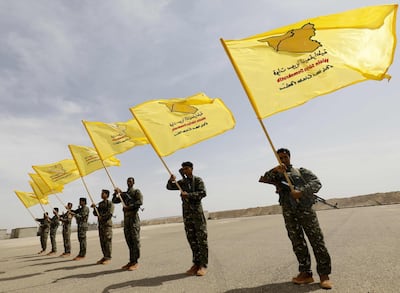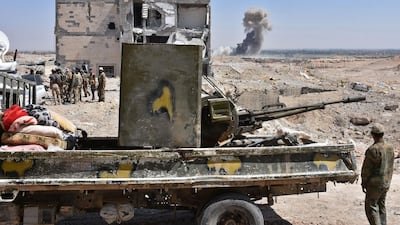An air strike on a Syrian-Iraqi border town on Sunday that killed dozens of fighters was carried out by Israel, according to a United States official talking to CNN. American forces had initially been blamed for the attack, with Iraqi Shiite militias and the Syrian regime pointing the finger at Washington.
However, US officials had denied the charge before the latest revelation came out.
These developments came as Turkey said it had started joint patrols with the US in the northern Syrian town of Manbij following an agreement between the two militaries last month to effect the withdrawal of the Kurdish YPG.
The US denied being behind the strike near the town of Al Bukamal just before midnight on Sunday. "No member of the US-led coalition carried out strikes near Al Bukamal," Major Josh Jacques, a US Central Command spokesman, told Reuters.
Iraq's Iran-backed Popular Mobilisation Forces said in a statement that the US had launched two missiles at a base killing 22 fighters and wounding 12 more. An Iraqi security source told The National that "60 members of the Popular Mobilisation Forces and the Syrian army forces loyal to Bashar Al Assad were injured and killed in an area located in the south of Al Herri, [in the Deir Ezzor province town of Al Bukamal]".
Officials in Baghdad said the dead were mostly members of Iraq's Hezbollah Brigades, which have been fighting alongside pro-Assad forces. Also killed were some members of the Sayyid Al Shuhada Battalions, they said.
Earlier in the day, Syrian state media also accused the US of being behind the strikes.
______________
Read more:
UN’s Syria envoy to hold talk with Russia, Iran and Turkey
Graffiti boys who sparked Syria uprising brace for regime attack
Dozens of pro-regime fighters killed in east Syria strike
______________
War monitor, the Syrian Observatory for Human Rights, which is based in Britain, said at least 52 non-Syrian fighters allied with the regime were killed in the raid. Iraqi, Iranian, Lebanese and Afghani fighters are among the militias fighting to support the Assad government .
Syrian regime forces and the US-backed Kurdish Syrian Democratic Forces (SDF) have been battling ISIS in Deir Ezzor. An ISIS offensive last week reached the outskirts of Al Bukamal before being repelled by government forces.
Air strikes by the US-led coalition have previously killed both Iraqi militia fighting ISIS in Iraq and Syria, as well as government forces and Russian contractors fighting in Syria on the government’s behalf.
Some of the strikes may have been accidental, while others have been intentional. In February, US strikes in eastern Syria killed Russian, Iraqi and Lebanese fighters after they apparently launched an attack on US-backed forces there. Some reports put the number of Russians killed in the hundreds.
The sheer number of groups on the ground and in the air has raised the likelihood of mistakes in Syria.
"There's no doubt that this is probably the most complex battlefield in recent history – but we are under the assumption that everyone's goal is the same – to defeat ISIS," Col Sean Ryan, a spokesman for the US-led coalition fighting ISIS in Iraq and Syria, told The National.
The US and Russian militaries maintain what they refer to as a line of “deconfliction” that runs roughly along the Euphrates River, with the US on the eastern side and Russia to the west.
Russian air strikes have also targeted fighters from the SDF militia, and there have been direct clashes between the US-backed group and the Syrian army as recently as late April.
The clashes presage a potentially much wider conflict – while the SDF has taken advantage of Syria’s civil war and US support to establish relative autonomy in much of eastern Syria, Mr Assad’s government has vowed to reclaim it.
“A lot of that is political discussions, disputes that they’ve had for a long time, and we try to keep out of that,” Col Ryan said. “We’re not looking for any type of beef with the Assad regime at all.”
However, Al Bukamal is only one of the flashpoints in the multifaceted conflict.
During a campaign speech in Turkey’s northern Samsun province, president Recep Tayyip Erdogan said Turkish-US military patrols had started on the outskirts of Manbij. The Turkish military also announced the news in a tweet.
Earlier this month, Ankara and Washington endorsed a “road map” for the withdrawal of the Syrian Kurdish YPG militia from Manbij and the deployment of Turkish and US forces into the region to secure the area.
Col Ryan said he was unable to confirm any details of the agreement.
The city became a flashpoint after Turkey carried out military operations to create a YPG-free zone in northern Syria. The Turkish government considers the group to be a terrorist organisation.
The YPG, however, is the backbone of the SDF, the US’s chief ally in Syria. The presence of US troops in support of the SDF in Manbij had raised fears in recent months they might come into direct conflict with Turkish forces.
The content and timeline of the three-stage agreement has not been made public but it was seen as a goodwill gesture from the US to mend relations with Ankara.
Aaron Stein, a fellow at the Atlantic Council's Rafik Hariri Center for the Middle East, told The National that the joint patrolling phase "is the easiest part of this entire [US-Turkey] arrangement in Manbij".
“The more challenging aspects of the agreement will come later when the two sides start to grapple over governance,” he said.

The local governing council is hostile to Turkey, and vice versa, and unlike patrolling, this will require real concessions from all sides, Mr Stein explained. Those concessions will relate to “aspects of governance inside the city”
Indeed, a spokesman for the Syrian Democratic Movement - the political body that effectively controls Manbij and most of the areas where the US military operates - said that the Turkish military would not enter the city.
“The United States may conduct joint patrols with the Turkish army on the dividing line,” said Abdulselam Ahmad, the co-chair of the Democratic Movement’s relations committee.
“We have been informed of the outline of the agreement, but the details are not clear. What we know is that the city will be managed by its people,” Mr Ahmad said.
However, the Manbij agreement itself, Mr Stein argued, is “seen by many as the US simply doing what it promised Turkey to do and in an effort to help reset the relationship”.
Meanwhile, a coalition-backed rebel force seized and destroyed drugs worth about US$1.4 million (Dh5.14m) during operations against ISIS in south-east Syria.
The coalition said the drugs captured by Maghawir Al Thawra on May 31 included the 300,000 Captagon pills, an amphetamine-like stimulant.

